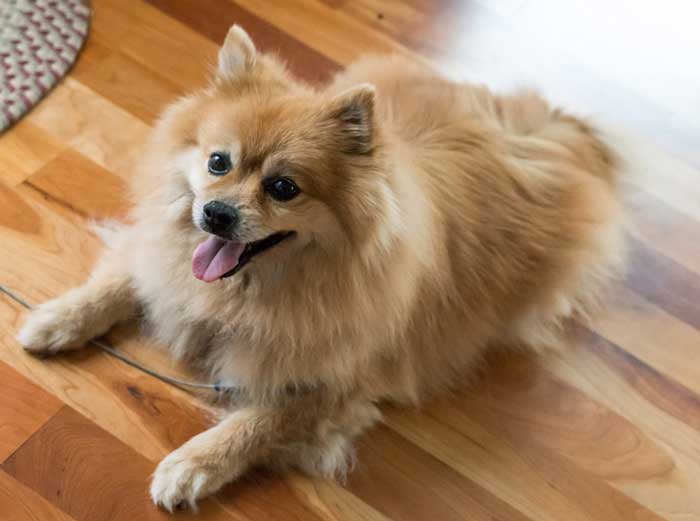The Pomeranian, also known as the Pom, is a toy dog breed that weighs between 3 and 7 pounds and a height between 7 and 12 inches. It’s a compact and robust breed with an abundant coat.
It’s a very popular breed with an outgoing, friendly and playful personality, although they can become quite bossy.
But although it’s a very small breed, are Pomeranians good apartment dogs?
Pomeranians can be good apartment dogs. Due to its small size, he doesn’t need much space or a yard. They handle being left alone well and are active dogs that get enough exercise with a few walks a day and some playtime.
But the Pomeranian is not like any other toy breed. It has a particular personality that may not be ideal for all people, although for others, it’s just what they need.
You have to know his personality and needs well to know if he adapts well, not only to apartment life but also to your lifestyle.
What You Should Know About Owning a Pomeranian
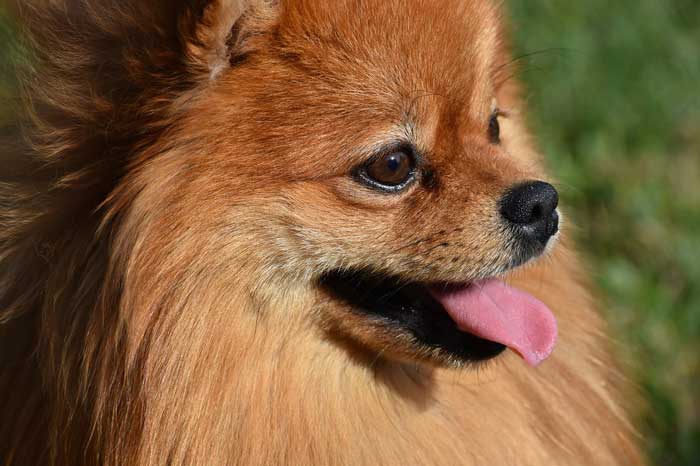
Pomeranians are very friendly, lively, and playful dogs. Although they can be aggressive towards other pets and people just to try to prove themselves.
They are intrepid dogs that don’t tend to be fearful of strangers and other animals. They actually have a reputation for being good watchdogs, and despite their size, they take the role of the guardian of the family and home very seriously.
Are Pomeranians Good with Kids?
Pomeranians are very friendly and playful with children and usually can have a good relationship.
But a Pom is a very small and fragile dog, so a child can easily hurt him while playing.
Pomeranians are also considered to be cautious dogs and often become defensive if they feel threatened. If a Pom is not comfortable and feels threatened when playing with a child, he may react defensively.
For the safety of the child and the Pomeranian, you should always keep an eye on the interaction between them to prevent the situation from getting out of control, for the safety of both.
Can a Pomeranian be Left Alone?
Pomeranians can handle being left alone well. An adult Pom usually can be alone without any problem between 6 and 8 hours.
Although you have to be careful that they don’t develop an anxiety disorder. This breed may tend to suffer from separation anxiety.
When they are puppies, especially if they are less than two months old, it’s important not to leave them alone for more than an hour.
When they are so young they are just discovering the world and building their self-confidence. Also, a puppy cannot hold his bladder for a long time so he has to go to the toilet regularly.
After two months you can start leaving them alone for about two hours. Gradually, if the dog is not forced, he can be left alone for longer.
You always have to be attentive to how they feel when they are alone to be able to help them if necessary.
Are Pomeranians Hard to Train?
If you have the patience, Pomeranians can be easy to train as they are an intelligent breed that likes to learn new things. The real challenge is to housetrain a Pomeranian.
They are dogs with an independent mind and can be manipulative and able to get everything they want from their owners.
We must consider that they can become dominant and stubborn if they are not trained and socialized from an early age. But with proper training, they can be good companions and friends.
Do Pomeranians Bark a Lot?
Pomeranians can bark a lot and constantly.
Poms are dogs that are always alert to everything that happens around them. Any small change or situation in their environment can trigger excessive barking.
They are usually territorial and often bark to alert that there is a person or animal near their home.
Proper socialization and training are essential to help a Pomeranian not to bark as much.
Pomeranian Activity Needs
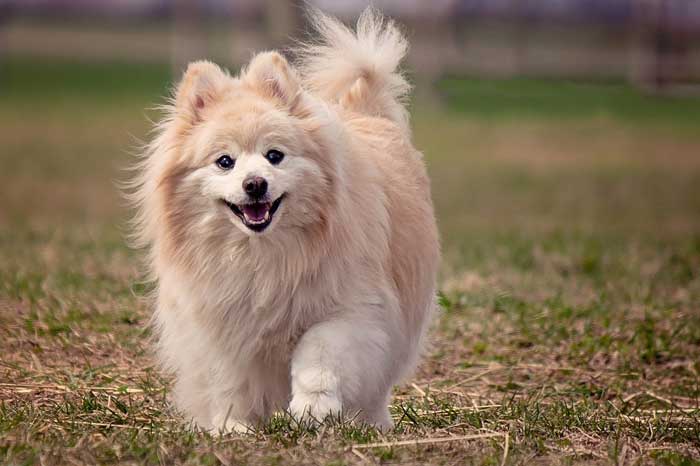
The Pomeranian, although he is a small dog breed, has a lot of energy and usually looks for ways to stay active.
Due to his small size, he can have enough exercise hanging around an apartment. But because of his enormous curiosity, he is very happy when he can go for a long walk around the neighborhood.
Pomeranians need a moderate amount of daily exercise to stay physically and mentally healthy. With a couple of long walks a day and with some playtime, a Pomeranian is more than satisfied.
When taking him for a walk, keep in mind that Pomeranians, due to their small size, can be sensitive to heat. On hot days, instead of having a long walk, a small walk or some time to play in the apartment is preferable.
Pomeranian Grooming Needs
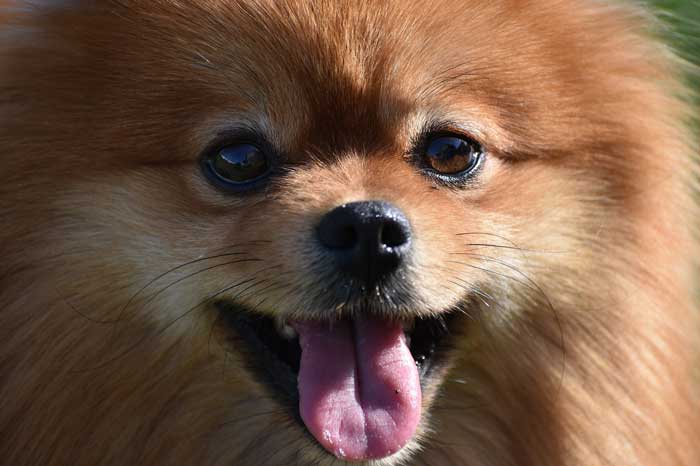
Pomeranians have an abundant double coat, but due to their small size, they are easy to groom. They need to be brushed at least twice a week so that their fur doesn’t tangle.
Pomeranians tend to shed a lot but if he is brushed regularly and thanks to his small size, this shouldn’t be a problem.
Pomeranians need to bathe at least every couple of months. Although, if necessary they can bathe more often, even once or twice a week.
Besides this, he only requires basic care. It’s necessary to cut his nails every couple of weeks if he doesn’t wear them down naturally and brush his teeth regularly to prevent any dental health problem.
Is a Pomeranian a Good Apartment Dog?
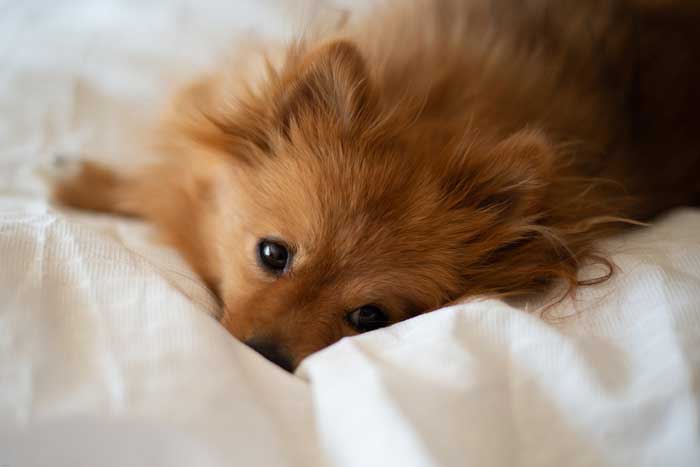
Pomeranians can be excellent apartment dogs. He is a small breed with a sociable, friendly and outgoing personality. It’s also a very active and playful dog although he doesn’t need much space or a yard to be happy.
But not everything is as easy as it seems with a Pomeranian. He has his personality and if he’s not taken care of properly, he can make life difficult in an apartment.
But there are several things you can do to make the Pomeranian the perfect companion and apartment roommate.
Tips for Raising a Pomeranian in an Apartment
1. The Challenge of Housetraining a Pomeranian
Training a Pomeranian is not difficult, he is an intelligent dog that likes to learn new things. You just have to be patient, gentle and consistent.
But Pomeranians have a reputation for being quite difficult to potty train.
In reality, toy breeds are almost always difficult to housetrain, and Pomeranians are no exception. One of the reasons is that small breeds can hold their bladder for less time than larger breeds.
For apartment living, there are two ways to potty train a Pomeranian. They can be trained to use puppy pads or go outside. Whatever the way, the important thing is to start early.
The first thing you need to do is choose a specific area where you want him to go to the bathroom and that is comfortable for you and your dog. You have to consider that you have to take it there regularly, especially when they are puppies.
An option can be a place outside, preferably with grass, near your apartment, or a place in your apartment that is not near the place where your dog sleeps or eats.
You have to take him regularly to the designated place so that he gets to know it and gradually the habit of doing in that place will be reinforced.
A daily routine helps you know when your dog needs to go to the bathroom. Always feed him at the same time and take him to the designated area right away.
Reward him and praise him when he does it in the desired place. If he doesn’t do it, you don’t have to force him or scold him, you just have to be attentive to any sign that he is going to do the bathroom, like smelling and looking for a place to go.
To avoid accidents when the housetrain is still not yet well established, he should be kept in a small contained area within the apartment. This is to prevent the Pomeranian from wandering around the entire apartment alone and from being tempted to pee somewhere in the apartment.
This place must be where he spends the most time and is where he will eat and sleep. You do not have to leave it alone there, you have to spend time in the place playing with him.
This place will become his favorite corner and he will avoid doing his business within it.
If you find him on the act and doing his things in an inappropriate place, don’t scold him, say a firm “No”, and take him to the designated place.
When you find a potty accident inside your home, there is no point in scolding him. Clean the place well with an enzymatic cleaner to remove all traces of the odor so he won’t be tempted to mark the same area again.
With perseverance and patience, your Pomeranian will be completely housetrained when you least expect it.
2. Teach Him to Control His Bark
Living in an apartment and being fairly close to the neighbors, the constant, high-pitched barking of a Pomeranian can be a major drawback.
It’s neither possible nor recommended to eliminate the barking of a Pomeranian. Barking is one way they communicate and there is always a reason why they bark.
The most common reasons are:
- To get your attention. Either to tell you that he wants to go to the bathroom or that he wants you to spend some time playing.
- To alert you about something they perceive as a threat. They generally alert you that a person or animal is at the door or near their territory. They also often bark when they hear unusual sounds near their home.
- Because they feel threatened by some person or animal and it is their way of asking him to get away from him and leave him alone.
- Because they feel distressed. Either because of physical pain, discomfort, or because they feel anxiety, mainly because of separation anxiety when they are left alone for a long time.
To decrease how often a Pomeranian barks, there are several things you can do:
- Make sure he has enough exercise. Being a very active dog and for the lack of exercise, a Pomeranian will feel restless and will most likely bark. Exercise helps burn off his extra energy and makes him feel calmer and more relaxed.
- Don’t let him get bored. Pomeranians are very smart and if they don’t have enough mental stimulation they will get bored easily and he will make you know by barking. Make sure you have dog toys like a food-dispensing toy on hand. Here you can find some good toy options to keep him busy.
- Offer him a place where he feels comfortable and safe. A place where he can retreat to rest if he feels overwhelmed or anxious. A small quiet place with his bed, toys and water.
3. Prevent Small Dogs Behavioral Issues
Pomeranians are smart dogs and if they are not properly trained and socialized, they tend to be bossy, dominant, and even aggressive.
It’s common for some small dogs, especially toy breeds, to owners allow them to get away with behaviors that can become an issue and complicate apartment life.
By pampering a Pomeranian, he will feel that he is the leader of the pack and that all his needs come first and that the rest of the family must obey. This is known as the small dog syndrome.
This can cause the Pom to develop various behavioral problems such as:
- Separation Anxiety which will make it impossible to leave him alone even for a few moments.
- Aggression towards other dogs and people by manifesting dominant behaviors.
- Possessive and protective behaviors can result in bites when he feels that his things like toys, food, or even people are threatened.
To avoid this type of behavior, obedience training is essential. The training allows the owner to take the role of the pack leader in front of the Pomeranian and the dog to learn the basic obedience rules and commands.
Also, as difficult as it is with these cute little pets, you have to treat a Pomeranian like a dog and not like a toy or a baby. Puppies should not be allowed to do things we don’t want them to do when they are older.
By giving a Pomeranian clear rules and limitations, he will understand his position within his pack and this will make him feel more secure and happy.
Final Thoughts
Small dog breeds are generally thought to be better for apartment living than larger dogs. But it’s not always like this. Whether a dog is a good apartment dog doesn’t depend on the size, but varies greatly from breed to breed.
Although the Pomeranian has some characteristics that are generally not recommended when you live with a dog in an apartment, such as his high energy level and his habit of barking a lot, the Pomeranian is considered a good apartment dog for many other reasons.
With the proper training and socialization, the Pomeranian can be a great companion and a good roommate for apartment living.
Resources
- Pomeranian: Pros and Cons of the Fluffiest Breed in Town by The Happy Puppy Site
- Personality Problems in Pomeranians in The Nest

